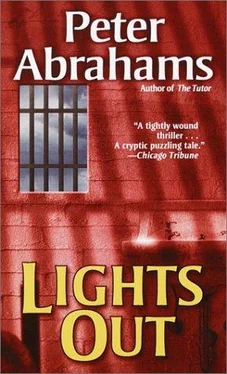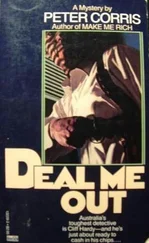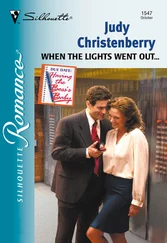Peter Abrahams - Lights Out
Здесь есть возможность читать онлайн «Peter Abrahams - Lights Out» весь текст электронной книги совершенно бесплатно (целиком полную версию без сокращений). В некоторых случаях можно слушать аудио, скачать через торрент в формате fb2 и присутствует краткое содержание. Год выпуска: 2002, ISBN: 2002, Издательство: Fawcett Books, Жанр: Триллер, на английском языке. Описание произведения, (предисловие) а так же отзывы посетителей доступны на портале библиотеки ЛибКат.
- Название:Lights Out
- Автор:
- Издательство:Fawcett Books
- Жанр:
- Год:2002
- ISBN:978-0345445780
- Рейтинг книги:4 / 5. Голосов: 1
-
Избранное:Добавить в избранное
- Отзывы:
-
Ваша оценка:
- 80
- 1
- 2
- 3
- 4
- 5
Lights Out: краткое содержание, описание и аннотация
Предлагаем к чтению аннотацию, описание, краткое содержание или предисловие (зависит от того, что написал сам автор книги «Lights Out»). Если вы не нашли необходимую информацию о книге — напишите в комментариях, мы постараемся отыскать её.
Lights Out — читать онлайн бесплатно полную книгу (весь текст) целиком
Ниже представлен текст книги, разбитый по страницам. Система сохранения места последней прочитанной страницы, позволяет с удобством читать онлайн бесплатно книгу «Lights Out», без необходимости каждый раз заново искать на чём Вы остановились. Поставьте закладку, и сможете в любой момент перейти на страницу, на которой закончили чтение.
Интервал:
Закладка:
It might have been a toy, but to Eddie it looked just like the nine-millimeters worn by the C.O.s in the towers. The boy spun it around on his index finger like a quick-draw artist, jabbed it at the man with four-inch nails, at a teddy bear against the wall, at the window where Eddie watched.
Eddie dropped to the ground. He was quick, surely too quick for the boy to have seen him. But the next moment came an explosion, and the window blew out over Eddie’s head. He scrambled away, dove among the nearest trees.
Voices rose from the house. Shadows made wild gestures in the blue light of the boy’s window. Then Paz poked his head out, peered around. Rain fell steadily and the night was quiet, except for the beating of Eddie’s heart against the earth.
“It’s just his imagination,” said Paz in Spanish, holding his ice-cream spoon. “All that TV.”
“That’s not the point,” said one of the old women in the room behind him. “He shouldn’t be playing with guns.”
Then came the high voice of the boy. “It’s mine,” he said. “And I saw someone out there, whether you believe me or not.”
“What kind of someone?” asked Paz, turning back to the room.
“All white. Like a ghost.”
Paz sighed. “Bedtime,” he said. He glanced outside again, picked a shard of glass out of the frame, withdrew. “Back to work,” Eddie heard him say. “And one of you get this fixed.”
The shadows moved out of the blue light. Eddie stayed still. The boy’s head appeared in the window. Eddie recognized him from the photograph on the wall of El Rojo’s cell. Simon Cruz, known as “Gaucho”-a fine boy and a dead shot, according to his proud papa.
Gaucho aimed his gun at the forest and said, “Pow, pow.”
Julio taped a piece of cardboard over the window. The farmhouse grew quiet, the lights went out. Rain began again, just a drizzle at first, then harder. It dripped down off the leafless branches onto Eddie. He circled the house, crawled under the truck and waited, listening to the rain.
It was still dark when he heard the door of the farmhouse open. Eddie rolled over, saw the glare of a flashlight, its beam zigzagging over the ground on an unsteady path toward the truck. For a moment it rested on Julio, carrying canvas bags over his shoulder.
“When is this rain going to stop?” he said in Spanish.
“All you do is complain,” answered the other man; Eddie recognized the voice of the driver.
“I hate this country.”
“So go home.”
Julio snorted.
The driver pointed his light at the truck. Eddie stayed still. With a grunt, Julio slung the canvas bags over the side, into the cargo space.
“I mean it,” he said. “What’s so good about this country?”
“The women,” replied the driver. They started back toward the house.
“The women? Are you joking?”
“They fuck like crazy.”
“So?” said Julio. “They hate men. At least our women like men. The women here piss me off. Sometimes I feel like just taking one, you know? One of those cool ones.”
They went into the house, came out with more canvas bags, tossed them into the truck. Then they climbed into the cab. The doors closed, the engine started, the truck vibrated above Eddie. He slid out from under, got a grip on the edge of the platform, and climbed up and over the side just as the truck drove away.
They mounted the rise, turned right on the main road, away from the gate. Eddie sat on the canvas bags. After a mile or two they took a narrow track, followed it through the woods. Eddie couldn’t see much but knew they came to a stream because he heard water flowing, knew they crossed a wooden bridge because he heard it creak. Not long after, they came to a clearing, a charcoal-colored opening in the night. The truck slowed. It hadn’t quite stopped when Eddie vaulted over the side, landed on all fours on hard-packed dirt, ran low into the woods. The driver cut the engine; headlights and brake lights flashed out.
They waited, Julio and the driver warm and dry in the cab, Eddie cold and wet in the trees. Eddie didn’t know what they were waiting for; he was waiting for Floyd K. Messer, although he couldn’t have given a logical reason why.
The night lost its blackness. Shadows firmed into solid shapes-the trees, the truck, the driver standing beside it, pissing against the wheel, a small car parked nearby. The eastern sky turned silver for a moment, then settled on dark gray. In the growing light, Eddie saw that the truck was parked at one end of a long, narrow dirt strip cut through the woods.
The driver, on his way back to the cab, went still, his head tilted up. Then Eddie heard it too, a plane coming from the south. Julio climbed from the cab into the cargo space, tossed the canvas bags onto the ground.
A white plane with green trim burst out of the clouds, very low, buzzed over the truck and landed not far away. It rolled down the strip, slowed, turned, rolled back. Eddie could see no one inside but the pilot, and he looked nothing like Messer. The pilot was wearing sunglasses. Maybe the sun was shining somewhere high above.
The plane halted beside the truck. The driver ran to it, swung open a compartment near the tail. Julio threw the canvas bags inside. The plane was already moving again by the time the driver closed the compartment. No one said a word.
The plane sped down the runway, lifted off, rose into the clouds, went silent, vanished.
“What a prick,” Julio said in English.
“They’re all like that,” the driver replied.
“Monday?” said Julio.
“Monday.”
The driver got into the truck, Julio into the car. They drove away.
Outside: Day 6
24
“How do you want to play this?” said Max Switzer, picking at his sandy mustache.
Karen de Vere hated when he did that, hated working with Max at all; he had no touch. Drawing his stupid gun on Eddie Nye, for example. He reminded her of her ex-husband, making his insufferable way up the ladder of Whiteshoe and Silverspoon, or whatever the hell it was. “It’s a no-brainer,” she said, with an edge in her voice; she heard it and sharpened it as she continued. “I say I’ve changed my mind.”
“And ask for the money back?”
“Bull’s-eye. It’s called a sting.”
“Then what happens?”
“Everyone fucks up in his or her own way, as always.”
Eddie entered Jack’s suite at the Palazzo. No one was there. Raleigh’s beer cans, the empty glasses, the pinkened towel, the cigar ashes; all gone. Tidy, quiet, peaceful; like the hotel room it was, ready for the next guest. Eddie searched for a note Jack might have left him, found none. He went into the bedroom, checked the fax, read a page about an engineering company in Dubai that wanted investors. “Jack-thar’s gold in them thar sands,” someone had scrawled at the bottom.
Eddie opened the closet. Jack’s suits still hung there by the dozen; shoes for every occasion lay in formation on the floor. He was out, not gone. Eddie kicked off the tassel loafers, chose a pair of sneakers. Lacing them up, he remembered that most inmates only tied their shoes tight when there was fighting to be done; it was one of the little things you looked for.
Eddie walked into the sitting room, looked out the window at a low sky of unbroken cloud. The first drops began to fall as he watched, thin streaks like scratches on gray slate, almost invisible. Down in the park a jogger in blue passed a jogger in red, was passed in turn by a jogger in green. Then a black dog trailing its leash zipped by all of them.
Eddie left the Palazzo and took a cab to Brainy’s. Brainy’s was closed, as he had expected. He walked the nearby streets in the rain. Everything looked different: because it was day, because he was sober, because he had a purpose. Not to take up where he’d left off; he knew he couldn’t do that. But he also knew he had to go back fifteen years, to revisit his life-as a spectator, perhaps, or an investigator. There were questions that had to be answered, questions raised by Evelyn Andrea Manning Packer Nye; partly by what she’d said, partly by how she’d ended up.
Читать дальшеИнтервал:
Закладка:
Похожие книги на «Lights Out»
Представляем Вашему вниманию похожие книги на «Lights Out» списком для выбора. Мы отобрали схожую по названию и смыслу литературу в надежде предоставить читателям больше вариантов отыскать новые, интересные, ещё непрочитанные произведения.
Обсуждение, отзывы о книге «Lights Out» и просто собственные мнения читателей. Оставьте ваши комментарии, напишите, что Вы думаете о произведении, его смысле или главных героях. Укажите что конкретно понравилось, а что нет, и почему Вы так считаете.












